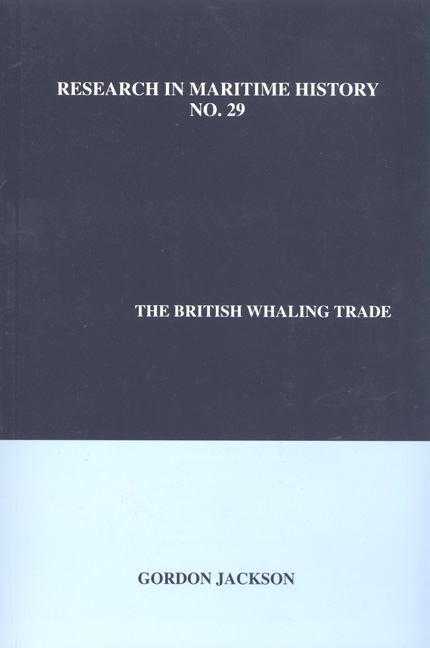New Introduction
Summary
When, in the 1970s, Ralph Davis asked me to write this book for a series of British trade histories, we agreed that since whaling was more akin to fishing than, say, to the timber or wine trades, it should be more than a blow-by-blow account of mercantile entrepreneurial activity and competition between British companies and ports, or a repetition of the patriotic school-boy tales of “derringdo,“ exploration, sturdy ships and human suffering that passed for whaling history. Ralph had taught me that facts are only important in context and tell us little until analysed as part of a pattern. So I set out to find patterns, first in my study of Hull whaling and then for this book. In fact, although the bibliography was huge, there were few publications that could inform my generalizations. Most interest was in seventeenth-century explorations or the 1750-1840 era, when Great Men performed Great Deeds and helped to found the British Empire.
One result of the paucity of economic information on the early rise and fall of British whaling was that I may have under-valued technical problems on the supply side, which have since been examined in great detail by Dutch scholars at the University of Groningen's Arctic Centre, and particularly in the impressive contributions of Louwrens Hacquebord. Indeed, detailed archaeological work at Smeerenburg by Hacquebord, Fritz Steenhuisen and Henk Waterbolk recently produced a convincing case for adjusting my conclusion that British incompetence in early catching caused their failure. Instead, their examination of British and Dutch processing plants shows that the Dutch were capable of producing a better class of oil, which was reflected in the tendency to import Dutch oil into Britain. Nonetheless, the argument that the British could not catch (or perhaps find) whales may still be justified for the dark period from 1670 to 1740. Elking was adamant that this was the case in the late seventeenth century, and the failure of the massive operation of the South Sea Company bears him out. Moreover, a Glasgow company, noting an earlier failure in 1673-1674, was convinced that there was “more probability of the company's succeeding.. .when they use the right means…in short the encouraging of foreigners to settle in Scotland, and to learn us many of the arts and mysteries we are still ignorant of would tend much to our temporal happiness.” (infra, chapter 2, section IV).
- Type
- Chapter
- Information
- The British Whaling Trade , pp. xiii - xviiiPublisher: Liverpool University PressPrint publication year: 2004



